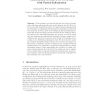Free Online Productivity Tools
i2Speak
i2Symbol
i2OCR
iTex2Img
iWeb2Print
iWeb2Shot
i2Type
iPdf2Split
iPdf2Merge
i2Bopomofo
i2Arabic
i2Style
i2Image
i2PDF
iLatex2Rtf
Sci2ools
124
click to vote
COCOON
2005
Springer
2005
Springer
Construction of Scale-Free Networks with Partial Information
It has recently been observed that the node degrees of many real-world large-scale networks, such as the Internet and the Web, follow a power law distributions. Since the classical random graph models are inadequate for explaining this phenomenon, alternative models have been proposed. However, most of the existing models unrealistically assume that each new joining node knows about all the existing nodes in the network. We relax this assumption and propose a model in which each new joining node uniformly and randomly chooses a sample set of existing nodes, and then connects to some nodes in the sample set according to the Preferential Attachment rule. We show that the power law of degree distribution still holds true even if each new joining node knows only a logarithmic number of existing nodes. Compared with the existing models, our construction of scale-free networks based on partial information seems to better approximate the evolution of certain complex networks arising in the re...
Related Content
| Added | 26 Jun 2010 |
| Updated | 26 Jun 2010 |
| Type | Conference |
| Year | 2005 |
| Where | COCOON |
| Authors | Jianyang Zeng, Wen-Jing Hsu, Suiping Zhou |
Comments (0)

